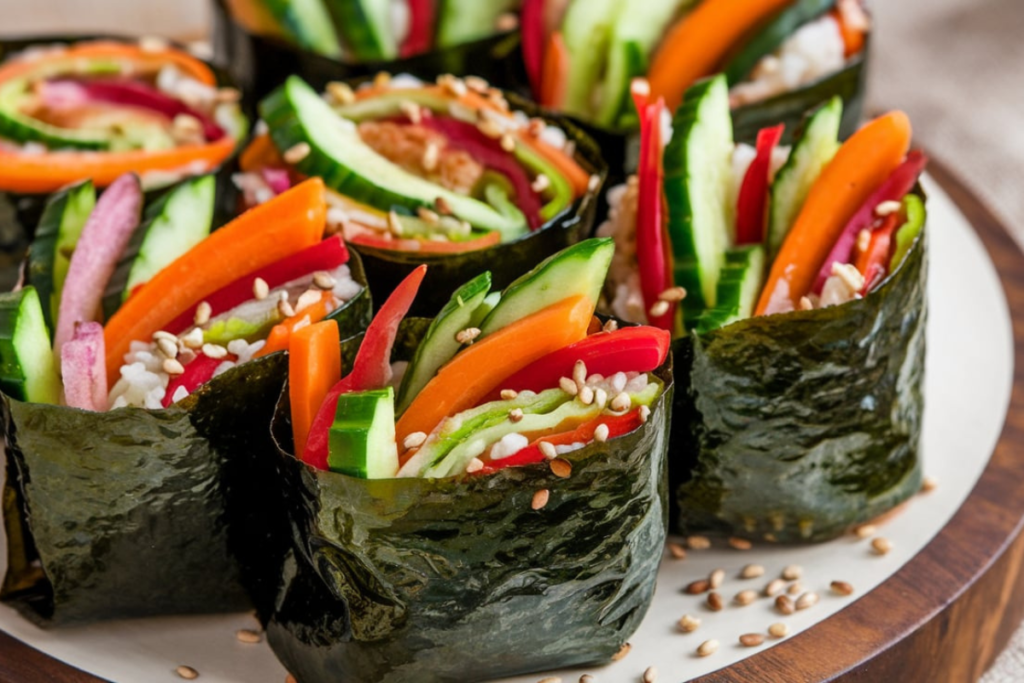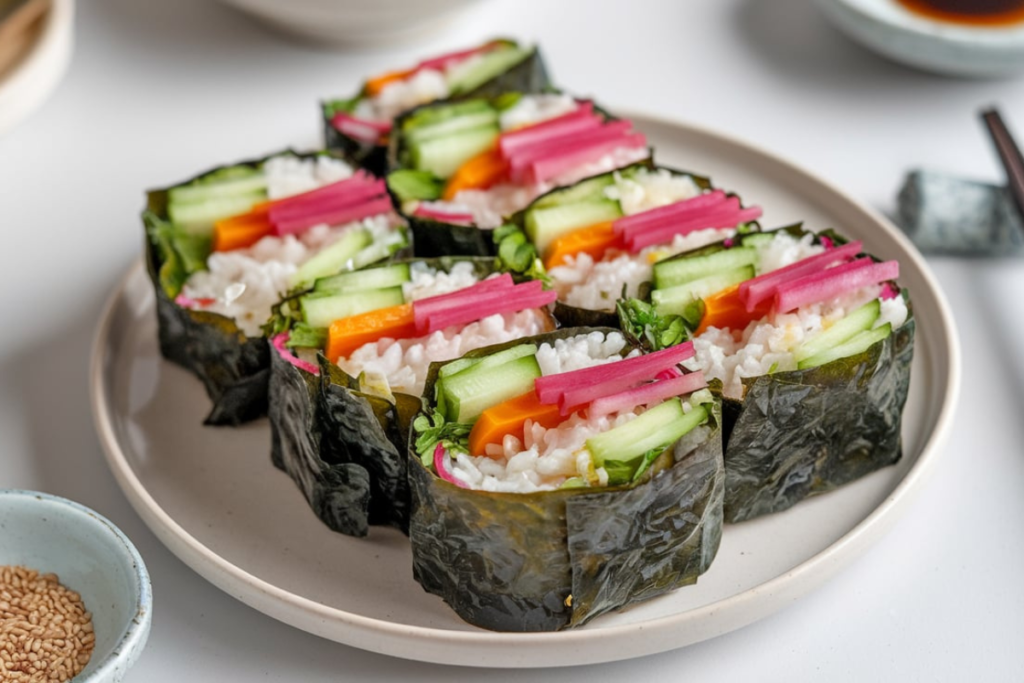Kimbap, a beloved Korean dish, has gained worldwide recognition for its unique blend of flavors and nutritional benefits. Often compared to sushi, kimbap offers a distinct culinary experience, combining seasoned rice with various vegetables, proteins, and seaweed. But beyond its delicious taste, kimbap is packed with nutrients that can support a healthy diet. In this article, we’ll explore the many benefits of kimbap, from its rich vitamin content to its role in weight management and heart health.
Introduction to Kimbap
Kimbap, also known as gimbap, is a traditional Korean dish made from steamed white rice (bap) and various ingredients rolled in dried seaweed (gim) and served in bite-sized slices. This dish is not only a popular street food in Korea but also a common meal for picnics, school lunches, and even quick snacks. The versatility of kimbap allows it to cater to a wide range of dietary preferences, making it a favorite for many.
But what sets kimbap apart from other rice-based dishes? The answer lies in its nutritional profile and the health benefits it offers. Packed with fresh vegetables, proteins, and nutrient-rich seaweed, kimbap is a balanced meal that can provide essential vitamins, minerals, and energy. For those looking to improve their diet, understanding the benefits of kimbap can be a great place to start.
Nutritional Composition of Kimbap
Kimbap is made up of several key ingredients, each contributing to its overall nutritional value:
- Rice: The primary component of kimbap is rice, typically seasoned with sesame oil and salt. Rice provides carbohydrates, which are the body’s primary source of energy. Additionally, when made with brown rice, kimbap can offer added fiber, which is beneficial for digestive health.
- Seaweed (Gim): The dried seaweed used in kimbap is a powerhouse of nutrients. Seaweed is rich in calcium, iron, iodine, and vitamin K. These nutrients are essential for bone health, thyroid function, and blood clotting. The nutritional benefits of seaweed are vast, making it an integral part of kimbap.
- Vegetables: Kimbap typically includes a variety of vegetables such as carrots, spinach, cucumbers, and pickled radish. These vegetables are excellent sources of vitamins A, C, and K, as well as fiber, which supports digestive health and provides a feeling of fullness.
- Proteins: Depending on the recipe, kimbap can include proteins like eggs, fish cakes, beef, or tofu. Proteins are essential for muscle repair, growth, and overall body function. The inclusion of lean proteins in kimbap makes it a well-rounded meal.
Vitamins and Minerals in Kimbap
The combination of ingredients in kimbap provides a variety of essential vitamins and minerals:
- Calcium: Found in seaweed and some vegetables, calcium is crucial for maintaining strong bones and teeth. It also plays a role in muscle function and nerve transmission.
- Iron: Seaweed and some protein sources in kimbap are rich in iron, which is necessary for the production of hemoglobin, the protein in red blood cells that carries oxygen throughout the body.
- Vitamin A: Vegetables like carrots and spinach in kimbap are high in vitamin A, which supports vision, immune function, and skin health.
- Vitamin C: This antioxidant is abundant in the vegetables used in kimbap, and it helps with the absorption of iron and supports the immune system.
- Vitamin K: Seaweed and leafy greens in kimbap provide vitamin K, which is important for blood clotting and bone health.

Health Benefits of Eating Kimbap
Kimbap offers several health benefits, making it an excellent choice for those looking to maintain or improve their overall health:
- Weight Management: Kimbap is relatively low in calories, especially when made with lean proteins and lots of vegetables. The high fiber content from the vegetables and seaweed helps promote a feeling of fullness, reducing the likelihood of overeating. Additionally, the complex carbohydrates in rice provide sustained energy without causing spikes in blood sugar levels.
- Heart Health: The ingredients in kimbap contribute to heart health in various ways. Seaweed, for instance, is high in potassium, which helps regulate blood pressure. The dish is also low in saturated fats, particularly when made with fish or tofu, which are heart-healthy protein options. Regular consumption of kimbap can thus contribute to a lower risk of heart disease.
- Digestive Health: Kimbap is high in fiber, especially when made with brown rice and plenty of vegetables. Fiber is essential for maintaining a healthy digestive system, as it helps regulate bowel movements and supports the growth of beneficial gut bacteria. The combination of fiber and other nutrients in kimbap can help prevent digestive issues like constipation and promote overall gut health.
- Energy Boost: The carbohydrates in kimbap, particularly from the rice, provide a quick and sustained energy boost, making it an ideal meal for those with active lifestyles. The inclusion of proteins ensures that this energy is balanced and long-lasting, preventing energy crashes that are common with simple carbohydrate-heavy .meals.Nutritional Value of Kimbap
Kimbap as a Convenient and Versatile Meal
One of the greatest advantages of kimbap is its convenience. It can be easily prepared in advance and packed for lunches, picnics, or on-the-go meals. This makes it a popular choice for busy individuals who need a nutritious and portable meal option.
Kimbap is also incredibly versatile. The fillings can be customized to suit dietary preferences or restrictions. For example:
- Vegetarian Kimbap: Fillings can include tofu, mushrooms, and a variety of vegetables, providing a plant-based meal that is rich in nutrients.
- Seafood Kimbap: Fish like tuna or salmon can be used, offering a source of omega-3 fatty acids, which are beneficial for heart and brain health.
- Meat Kimbap: Lean meats such as beef or chicken provide additional protein, making the dish more filling and satisfying.
This versatility makes kimbap an excellent option for those following specific diets or seeking to incorporate more variety into their meals.
Kimbap vs. Sushi: Nutritional Comparison
Kimbap is often compared to sushi due to their similar appearance, but there are several key differences between the two, especially in terms of nutritional content.
- Ingredients: While both dishes use rice and seaweed, sushi often includes raw fish, whereas kimbap typically uses cooked ingredients. Additionally, kimbap is more likely to include a variety of vegetables, while sushi often focuses on seafood.
- Seasoning: The rice in sushi is seasoned with vinegar, which adds a tangy flavor, while kimbap rice is seasoned with sesame oil and salt, giving it a richer, nuttier taste. The use of sesame oil also adds healthy fats to kimbap.
- Nutritional Value: Both kimbap and sushi can be healthy, but the overall nutritional value depends on the specific ingredients used. Kimbap tends to be more filling due to the inclusion of various vegetables and proteins. For a deeper understanding of the difference between kimbap and sushi, check out this comparison.

How Kimbap Fits into a Balanced Diet
Kimbap can easily be incorporated into a balanced diet due to its nutrient density and versatility. Here’s how you can include kimbap in your diet:
- Weight Loss Diet: Opt for brown rice and fill your kimbap with plenty of vegetables and lean proteins. This version is low in calories but high in fiber and essential nutrients, making it a great option for weight loss.
- Low-Carb Diet: If you’re following a low-carb diet, consider making kimbap with cauliflower rice or reducing the amount of rice and increasing the vegetable content. This way, you can enjoy the flavors of kimbap while adhering to your dietary goals.
- Balanced Diet: For those following a general balanced diet, kimbap can be a complete meal when paired with a side of fresh salad or miso soup. The combination of carbohydrates, proteins, and fats makes it a nutritious and satisfying option.
Frequently Asked Questions (FAQs) Nutritional Value of Kimbap
Is Kimbap Good for Weight Loss?
Yes, kimbap can be a great option for weight loss, especially when made with brown rice and plenty of vegetables. The high fiber content helps you feel full longer, reducing the likelihood of overeating. However, be mindful of the portion size and the ingredients used, as some variations may be higher in calories.
How Many Calories Are in a Roll of Kimbap?
The calorie content of kimbap can vary depending on the ingredients used. On average, a standard roll of kimbap contains around 300-400 calories. Using lean proteins and plenty of vegetables can keep the calorie count lower, making it a healthy meal option.
Can Kimbap Be Made Gluten-Free?
Yes, kimbap can be made gluten-free by using gluten-free soy sauce and ensuring that all other ingredients, such as the seaweed and any marinades or seasonings, are gluten-free. This makes kimbap a versatile dish that can cater to those with gluten sensitivities or celiac disease.
Potential Drawbacks and Considerations
While kimbap is generally healthy, there are a few considerations to keep in mind:
- High Sodium Content: Some versions of kimbap may be high in sodium, particularly if pickled vegetables or soy sauce are used in large quantities. To reduce sodium intake, consider using fresh vegetables and low-sodium soy sauce.
- Dietary Restrictions: If you have specific dietary restrictions, such as gluten sensitivity or allergies to certain ingredients, it’s important to modify the kimbap recipe accordingly. Fortunately, kimbap is highly customizable, allowing you to create a version that suits your needs.
- Portion Control: Kimbap can be quite filling, so it’s important to pay attention to portion sizes, especially if you’re watching your calorie intake. Pairing kimbap with a side salad or soup can help create a more balanced meal.

Conclusion: Why Kimbap is a Healthy Choice
Nutritional Value of Kimbap : Kimbap is more than just a delicious Korean dish; it’s a nutritious and versatile meal that offers numerous health benefits. From supporting weight management and heart health to providing essential vitamins and minerals, kimbap can be a valuable addition to any diet. Its convenience and adaptability make it an excellent option for those seeking a balanced, on-the-go meal.
Whether you’re looking to lose weight, boost your nutrient intake, or simply enjoy a tasty and satisfying meal, kimbap is a great choice. So why not try incorporating kimbap into your diet and experience the benefits for yourself?

